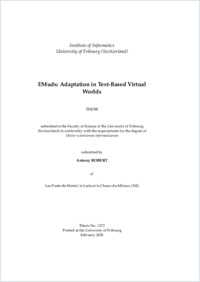EMuds : adaptation in text-based virtual worlds
- Robert, Antony
- Courant, Michèle (Degree supervisor)
-
17.12.1999
102 p
Thèse de doctorat: Université de Fribourg, 1999
English
French
This thesis introduces a methodological approach to artificial agent design. In an attempt to solve the symbol grounding problem of artificial intelligence, a new theoretical perspective on the agent-environment relation is explored and experimentation is led to motivate this methodology. From the original idea that in order to ground an agent in an environment, the agent’s representation mechanisms must intuitively be close to the structure of the environment, the hypothesis that grounding is possible only when an agent is able to apply information compression to its internal representation of the environment is discussed. This leads to the suggestion that a classification of control algorithms be made, based on the resources an algorithm requires to efficiently solve various categories of problems. In order to support this hypothesis, an experiment environment platform called the EMud is designed and implemented. The environment model is designed to support sufficiently general structures, so that gradually more complex environments can be designed within their specification framework, in particular to be able to use the model as a simulation of distributed systems where artificial agents operate. As a sample algorithm used to advocate the theoretical ideas, an XCS classifier system is implemented. A formal presentation of this system is made and the equivalence of Q-Learning with a simplified version of XCS is demonstrated. A reformulated illustration of the role of accuracy in the system is also presented. Experimentation with multiplexer problems is then performed to exhibit the information compression or generalization properties of the XCS system. By using an approach where experiments on the representation of the multiplexer problem are performed, the generalization characteristics of the XCS system and their influence in solving the problem are studied. A further experiment in an EMud environment where temporal information is essential to solving the problem goes to show that the XCS system is unable to generalize in this situation, thus breaking down the efficiency of the system. It is concluded that by making a classification of algorithms based on the efficiency with which algorithms can represent various types of problem space in order to solve these problems, one should be able to better understand how artificial agents should be designed for specific problems.
Cette thèse introduit une approche méthodologique à la conception d'agents artificiels. En une tentative de résoudre le problème de l'enracinement symbolique en intelligence artificielle, une nouvelle perspective théorique sur la relation agent-environnement est explorée et un jeu d'expériences sont menées pour motiver cette méthodologie. Suite à l'idée selon laquelle l'enracinement d'un agent dans son environnement est dépendant, intuitivement, de l'adaptation de ses mécanismes de représentation internes à la structure de l'environnement, l'hypothèse discutée est que l'enracinement n'est possible que si un agent est capable d'appliquer un principe de compression d'information à sa représentation de l'environnement. Ceci mène à la suggestion que les algorithmes de contrôle d'agents soient classifiés selon les ressources nécessaires à ces algorithmes pour résoudre une série de problèmes types. Pour soutenir cette hypothèse, une plateforme d'expérimentation appelée EMud a été conçue et implémentée. Le modèle d’environnements supporté par cette plateforme à été élaboré pour que des expériences graduellement plus complexes puissent être effectuées, en particulier pour que le modèle puisse être utilisé dans le cadre de simulations de systèmes distribués dans lesquels des agents artificiels opèrent. Le type d'algorithme choisi pour tester les idées théoriques introduites dans la première partie de la thèse est le système classificateur XCS, dont une version à été implémentée. Au cours de la présentation formelle de ce système, une démonstration de l'équivalence d’une forme simplifiée de ce système avec l'algorithme de Q-Learning est faite. Une nouvelle illustration du rôle de la notion de précision dans ce système est aussi introduite. Des expériences sur le problème du multiplexeur sont ensuite menées pour exhiber les propriétés de compression d'information or de généralisation du XCS. En utilisant une approche sur différentes représentations du multiplexeur, la capacité à généraliser du système XCS et son influence sur la résolution du problème est étudiée. Par la suite, une seconde expérience dans laquelle l'information nécessaire à la résolution du problème est répartie temporellement est menée. Les résultats dans cette situation montrent que le système XCS est incapable de généraliser efficacement. Il est conclu que par une classification des algorithmes basée sur l'efficacité avec laquelle ceux-ci peuvent représenter l'information nécessaire à la résolution de problèmes types, il devrait être possible de mieux comprendre comment concevoir des agents artificiels pour des problèmes spécifiques.
- Faculty
- Faculté des sciences et de médecine
- Department
- Département d'Informatique
- Language
-
- English
- Classification
- Computer science and technology
- License
-
License undefined
- Identifiers
-
- RERO DOC 4463
- URN urn:nbn:ch:rero-002-102236
- RERO R268330960
- Persistent URL
- https://folia.unifr.ch/unifr/documents/299591
Statistics
Document views: 392
File downloads:
- Texte intégral: 229
